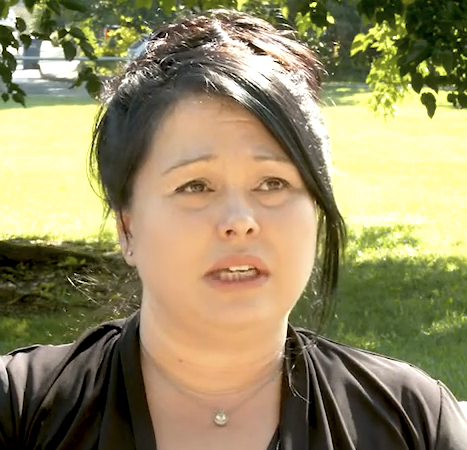It only takes one caring and consistent adult to help a child thrive
Seven positive childhood experiences
- Able to discuss feelings with family
- Family support during hard times
- Participated in community traditions
- Felt a sense of belonging in high school
- Felt supported by friends
- Support from adults that weren’t parents
- Felt safe and protected by an adult at home

Five ways parents and role models can promote healthy development in children
-
01

Express Care
Show that they matter to you
- Be someone they can trust
- Listen and pay attention when you are together
- Make them feel known & valued
- Show them you enjoy being with them
- Encourage & praise them for effort & achievement
-
02

Challenge Growth
Push them to keep getting better
- Expect them to live up to their potential
- Push them to go further
- Hold them accountable and insist they take responsibility for their actions
- Reflect on failures and help them learn from mistakes and setbacks
-
03

Provide Support
Help completing tasks and achieving their goals
- Guide them through hard situations and systems
- Build their confidence to take charge of their life
- Advocate & stand up for them when they need it
- Set boundaries and put limits in place that keep them on track
-
04

Share Power
- We take each other seriously and treat each other fairly
- We involve each other in decisions that affect each person
- We work together to solve problems and goals
- We give each other chances to make decisions and take the lead
-
05

Expand Possibilities
- We inspire each other to be hopeful for the future
- We introduce each other to people who can help us grow
- We expose each other to new ideas, experiences, and places


“Every kid is one caring adult away from a success story”
-Josh Shipp – Youth Expert and Teen Speaker
Mentor Story: Jonavan & Gene
“My mentor, Gene, has helped me a lot throughout my life… he gave me the ability to prove to people that I am a hard worker, and no matter what I came from, I can still do my job without any struggles… he helped me graduate high school… it means a lot. He feels like my family member now… I can’t thank him enough.”
5 Protective Factors
Five Protective Factors are the foundation of the Strengthening Families Approach: parental resilience, social connections, concrete support in times of need, knowledge of parenting and child development, and social and emotional competence of children.

Parental Resilience
No one can eliminate stress from parenting, but a parent’s capacity for resilience can affect how a parent deals with stress. Resilience is the ability to manage and bounce back from all types of challenges that emerge in every family’s life. It means finding ways to solve problems, building and sustaining trusting relationships, including relationships with your own child, and knowing how to seek help when necessary.
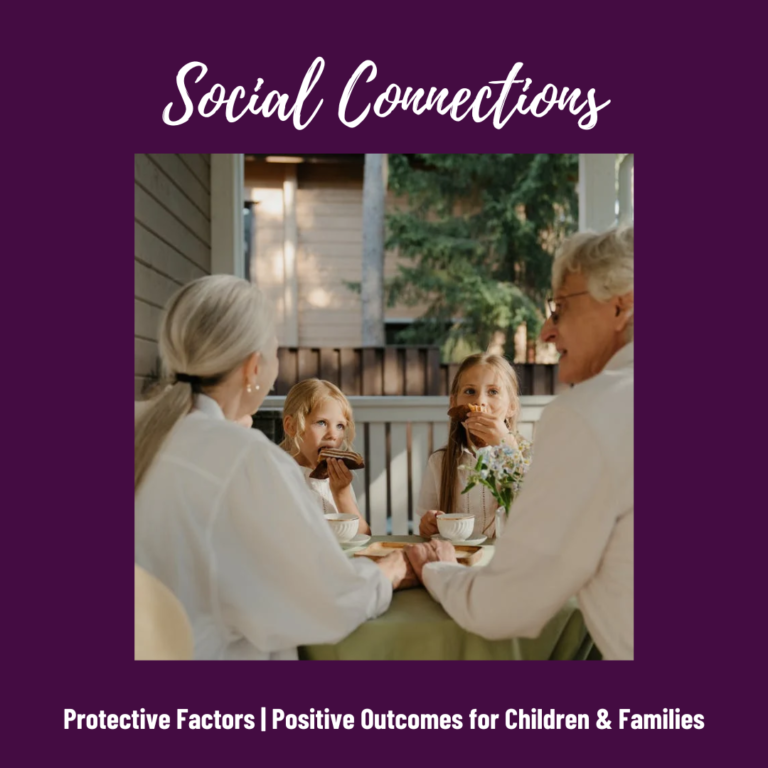
Social Connections
Friends, family members, neighbors, and community members provide emotional support, help solve problems, offer parenting advice, and give concrete assistance to parents. Networks of support are essential to parents and offer opportunities for people to “give back”, an important part of self- esteem as well as a benefit for the community. Isolated families may need extra help in reaching out to build positive relationships.
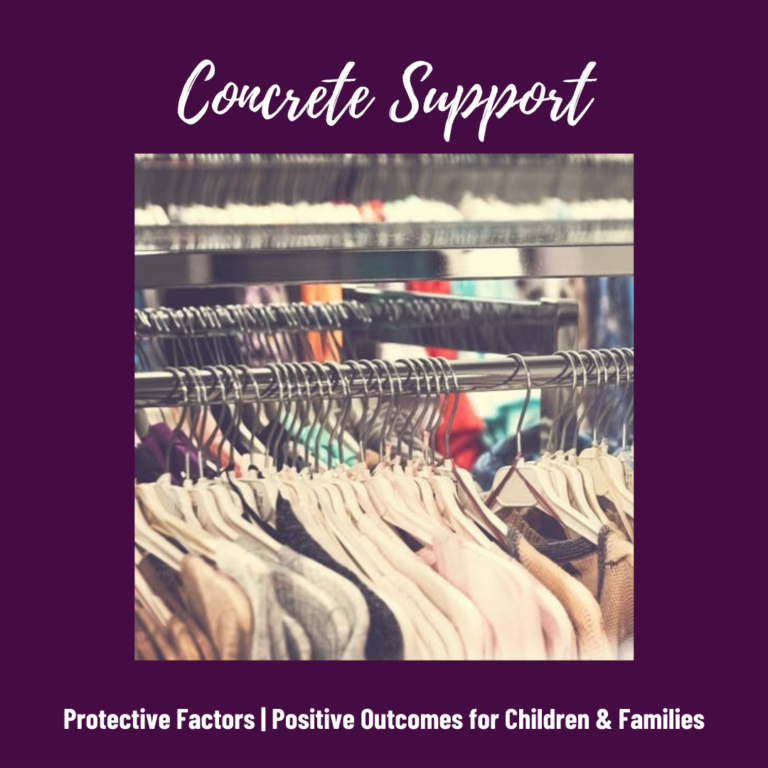
Concrete Support in Times of Need
Meeting basic economic needs like food, shelter, clothing and health care is essential for families to thrive. Likewise, when families encounter a crisis such as domestic violence, mental illness or substance abuse, adequate services and supports need to be in place to provide stability, treatment and help for family members to get through the crisis.
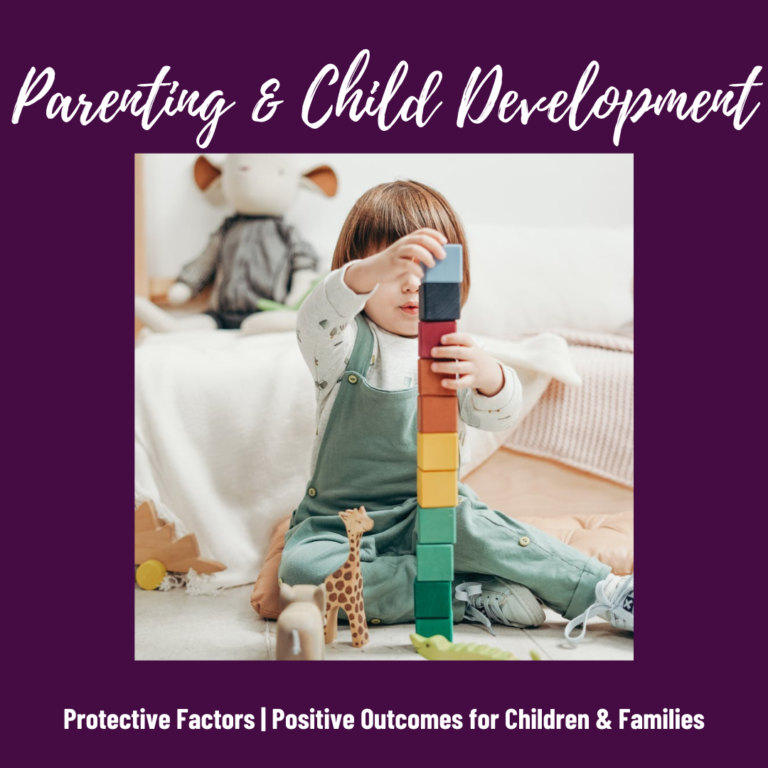
Knowledge of Parenting and Child Development
Accurate information about child development and appropriate expectations for children’s behavior at every age help parents see their children and youth in a positive light and promote their healthy development. Information can come from many sources, including family members as well as parent education classes and surfing the internet. Studies show information is most effective when it comes at the precise time parents need it to understand their own children. Parents who experienced harsh discipline or other negative childhood experiences may need extra help to change the parenting patterns they learned as children.
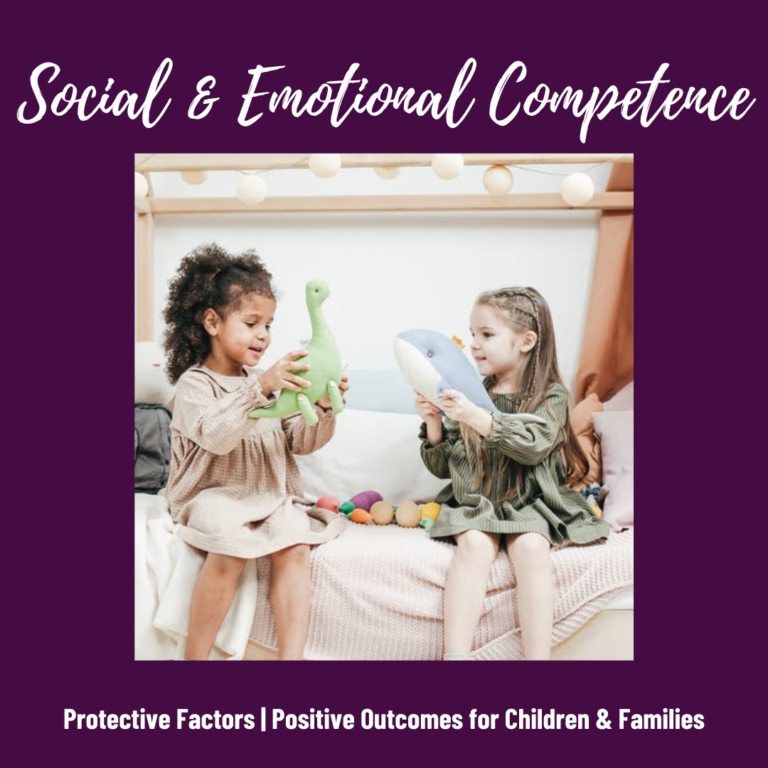
Social and Emotional Competence of Children
A child or youth’s ability to interact positively with others, self-regulate their behavior and effectively communicate their feelings has a positive impact on their relationships with their family, other adults, and peers. Challenging behaviors or delayed development create extra stress for families, so early identification and assistance for both parents and children can head off negative results and keep development on track.
Developmental Relationships
Developmental relationships are close connections through which young people discover who they are, shape their own lives, and learn how to engage with and contribute to the world around them.
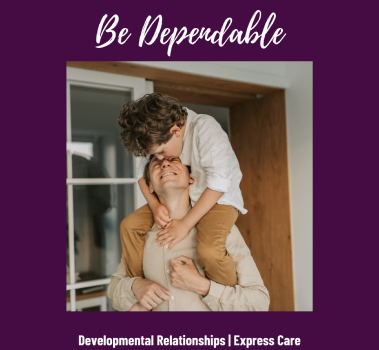
Express Care | Show me that I matter to you.
Be dependable · Be someone I can trust.
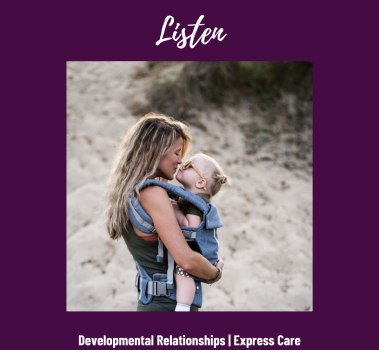
Express Care | Show me that I matter to you.
Listen · Really pay attention when we are together.
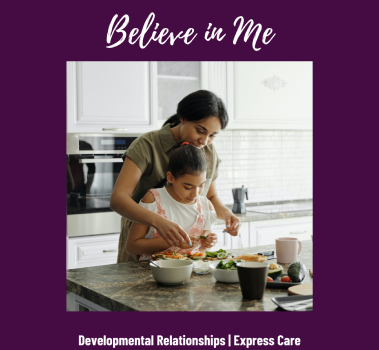
Express Care | Show me that I matter to you.
Believe in me · Make me feel known and valued.

Express Care | Show me that I matter to you.
Be warm · Show me you enjoy being with me.
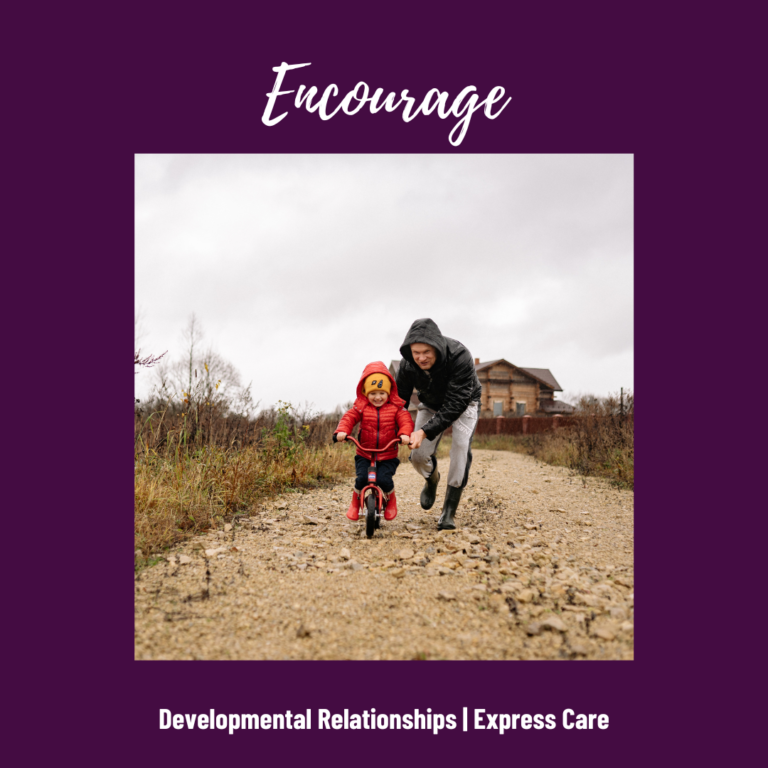
Express Care | Show me that I matter to you.
Encourage · Praise me for my efforts and achievements.
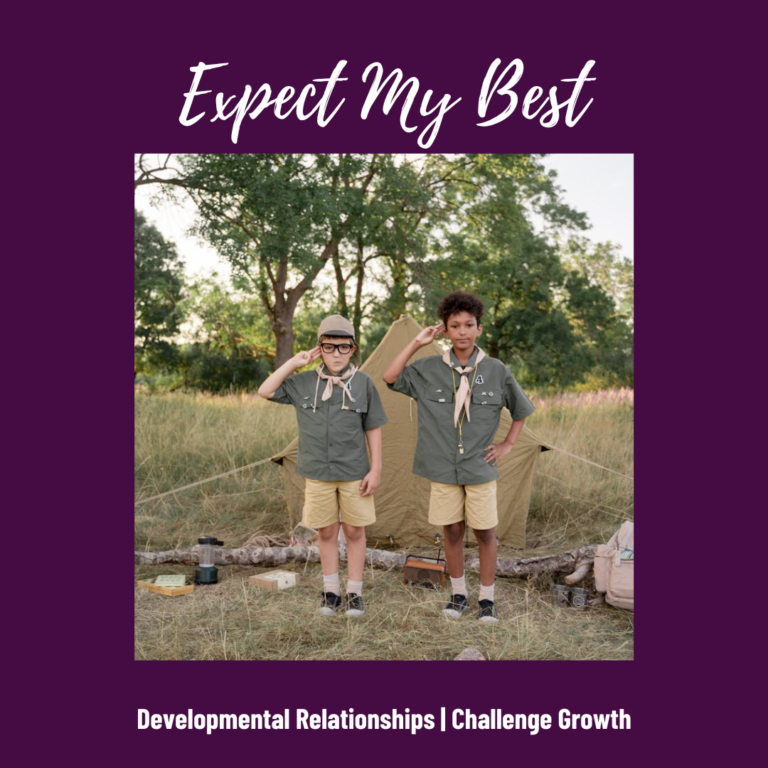
Express Care | Show me that I matter to you.
Encourage · Praise me for my efforts and achievements.
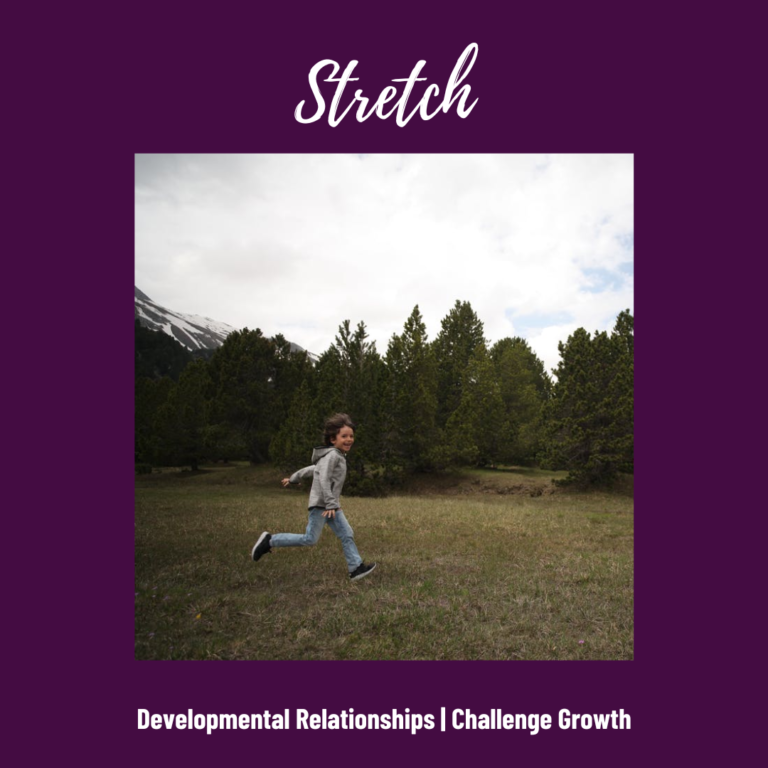
Challenge Growth | Push me to keep getting better
Stretch · Push me to go further.
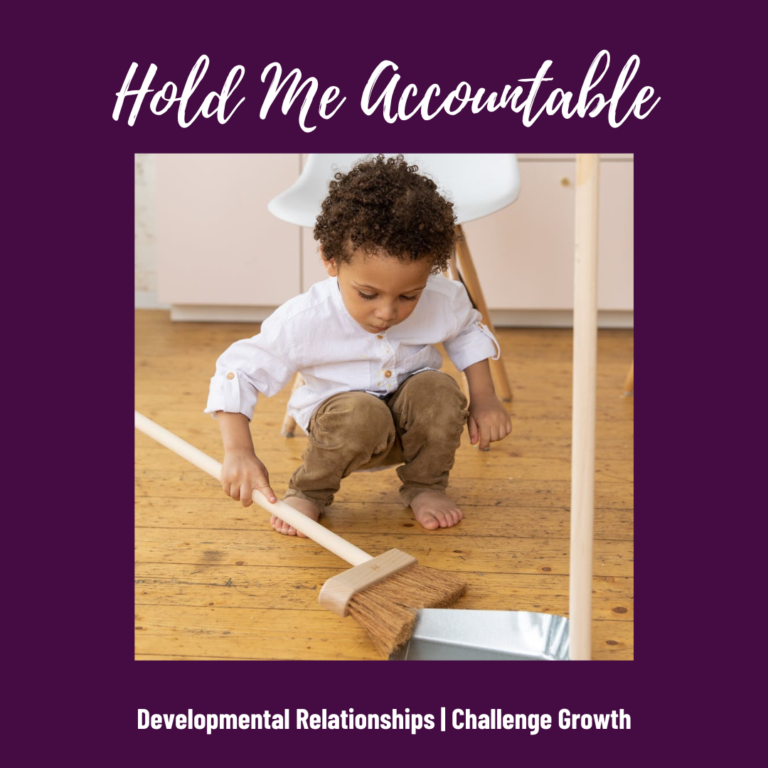
Challenge Growth | Push me to keep getting better.
Hold me accountable · Insist I take responsibility for my actions.
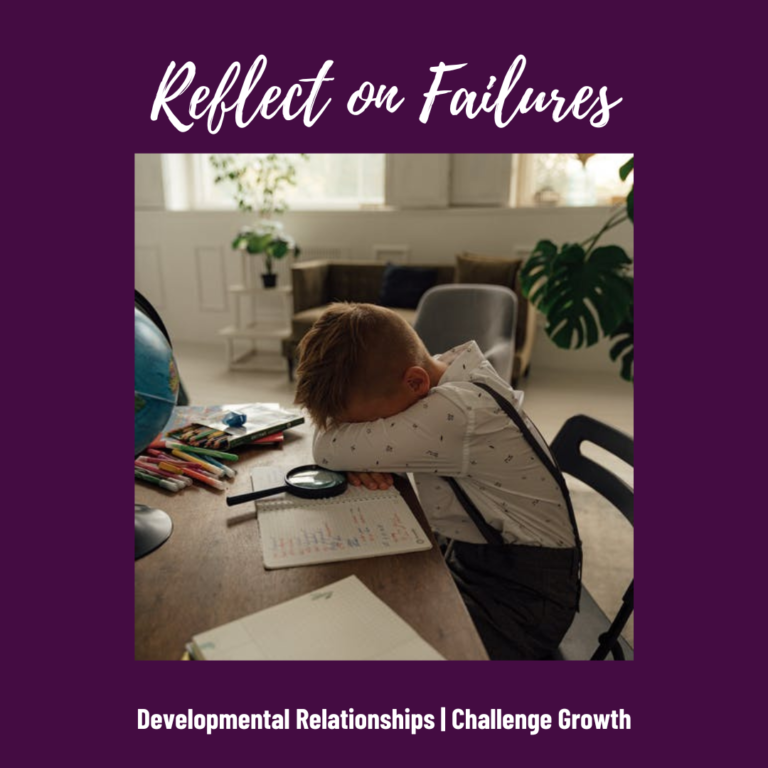
Challenge Growth | Push me to keep getting better.
Reflect on failures · Help me learn from mistakes and setbacks.
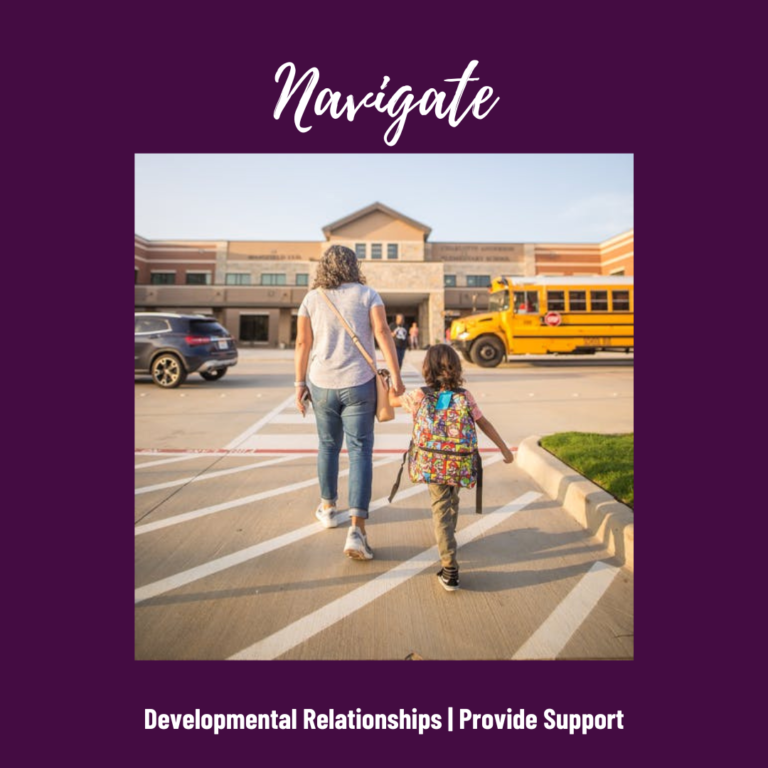
Provide Support | Help me complete tasks and achieve goals.
Navigate · Guide me through hard situations and systems.
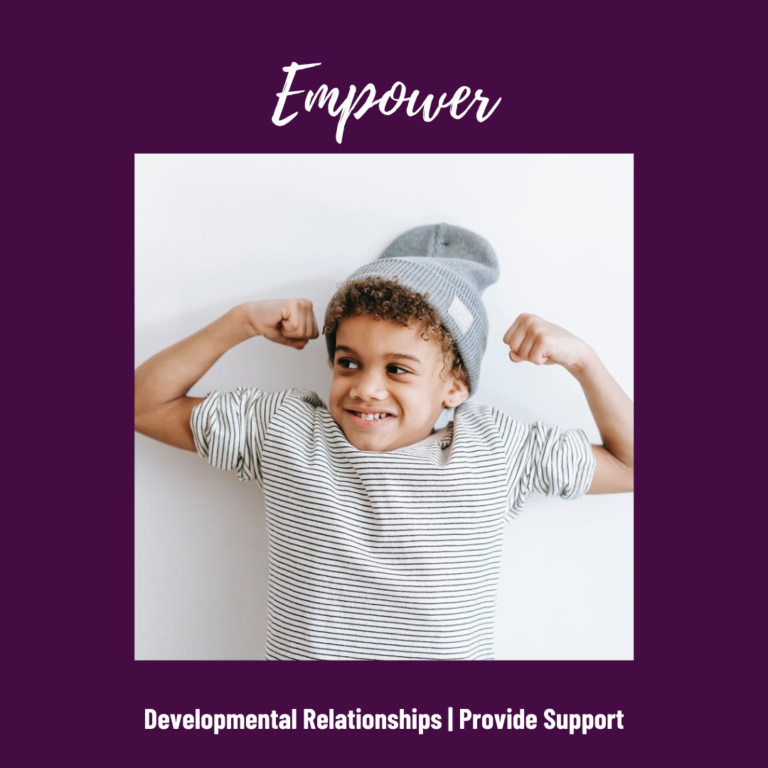
Provide Support | Help me complete tasks and achieve goals.
Empower · Build my confidence to take charge of my life.
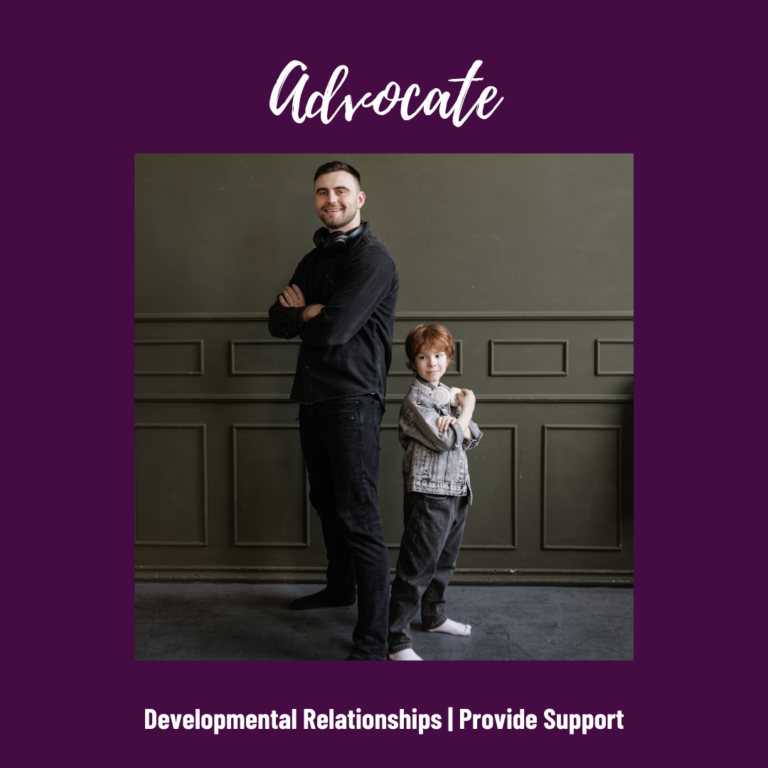
Provide Support | Help me complete tasks and achieve goals.
Advocate · Stand up for me when I need it.
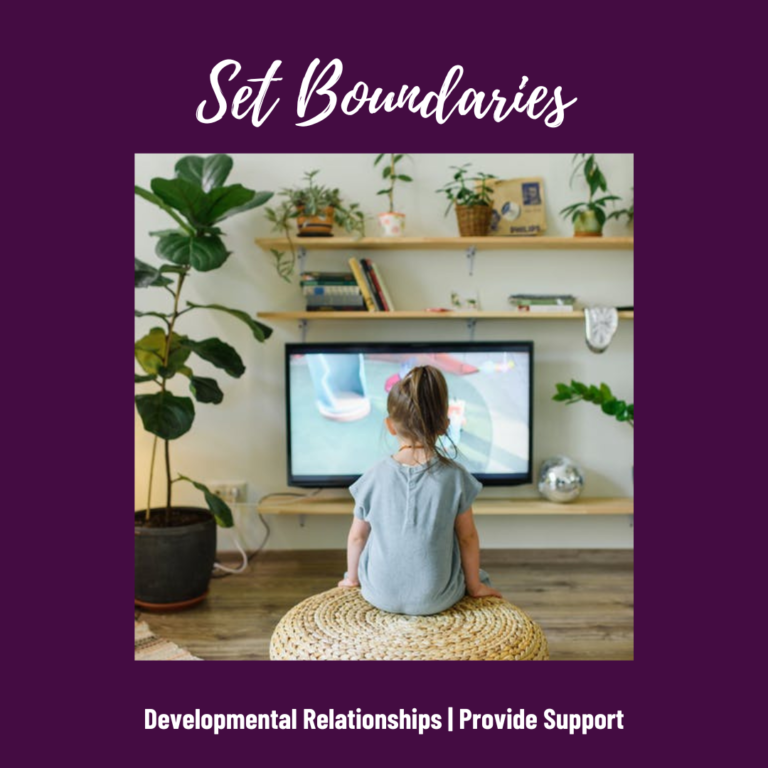
Provide Support | Help me complete tasks and achieve goals.
Set boundaries · Put limits in place that keep me on track.
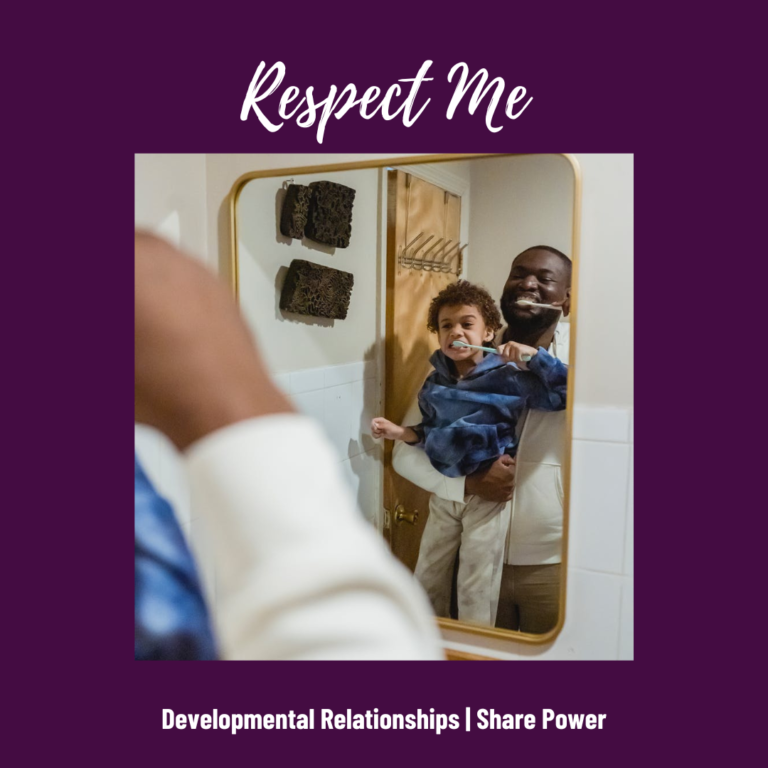
Share Power | Treat me with respect and give me a say.
Respect me · Take me seriously and treat me fairly.

Share Power | Treat me with respect and give me a say.
Include me · Involve me in decisions that affect me.
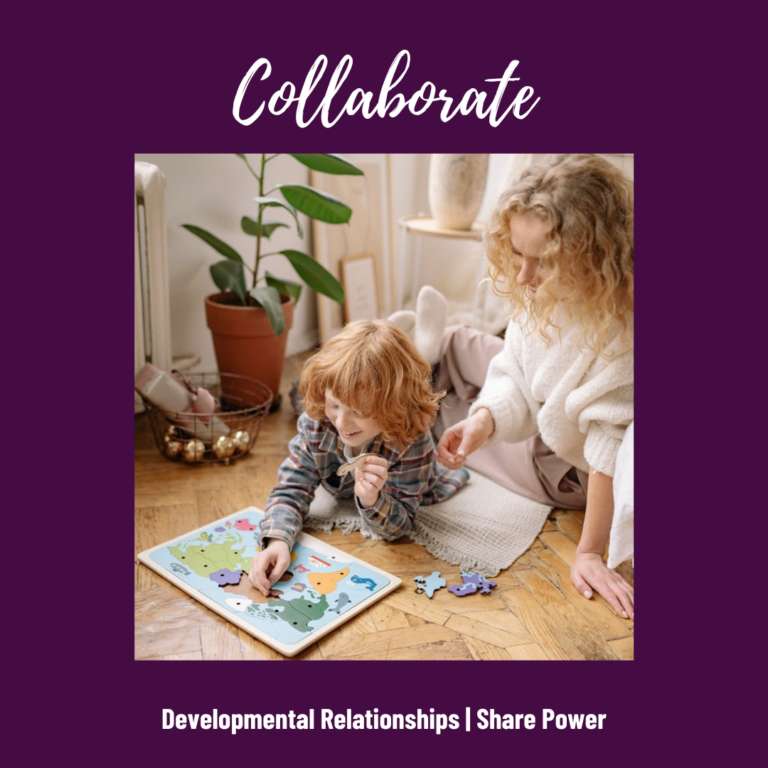
Share Power | Treat me with respect and give me a say.
Collaborate · Work with me to solve problems and reach goals.

Share Power | Treat me with respect and give me a say.
Let me lead · Create opportunities for me to take action and lead.

Expand Possibilities | Connect me with people and places that broaden my world.
Inspire · Inspire me to see possibilities for my future.

Expand Possibilities | Connect me with people and places that broaden my world
Broaden horizons · Expose me to new ideas, experiences, and places.

Expand Possibilities | Connect me with people and places that broaden my world
Connect · Introduce me to people who can help me grow.
40 Developmental Assets
The 40 Developmental Assets are positive supports and strengths identified by the Search Institute that young people need to succeed.
- Support | Young people need to be surrounded by people who love, care for, appreciate, and accept them
- Empowerment | Young people need to feel valued and valuable. This happens when youth feel safe and respected
- Boundaries and Expectations | Young people need clear rules, consistent consequences for breaking rules, and encouragement to do their best
- Constructive Use of Time | Young people need opportunities – outside of school – to learn and develop new skills and interests with other youth and adults
- Commitment to Learning | Young people need a sense of the lasting importance of learning and a belief in their own abilities
- Positive Values | Young people need to develop strong guiding values or principles to help them makes healthy life choices
- Social Competencies | Young people need the skills to interact effectively with others, to make difficult decisions, and to cope with new situations
- Positive Identity | Young people need to believe their own self-worth and to feel that they have control over the things that happen to them

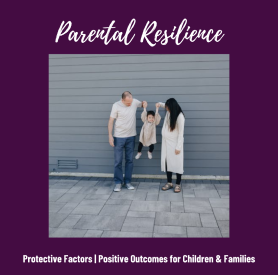
Family Support · Provide love and support to your child and other children in your extended family
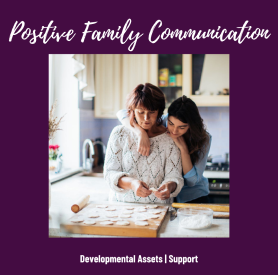
Positive Family Communication · Communicate with your child in a positive way. Encourage them to ask you for advice or guidance when needed.
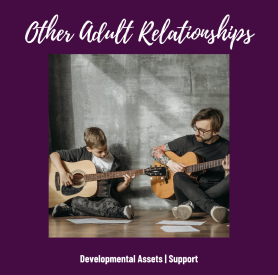
Other Adult Relationships · It’s important for children to receive support from three or more other positive adults in their life.
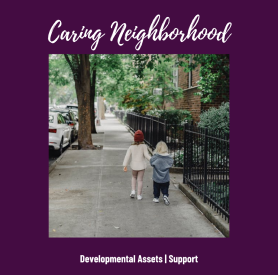
Caring Neighborhood · Get to know your neighbors by spending time with them. Be a caring neighbor by waving or saying “hi” when you see them and by looking out for their safety.
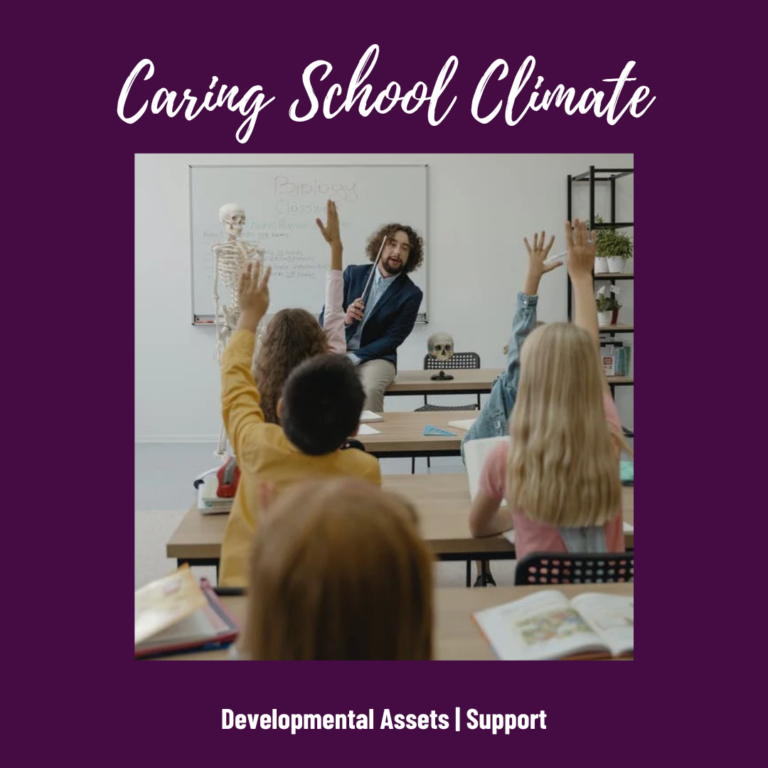
Caring School Climate · Get to know your child’s teachers and classmates’ parents. Support their teachers by volunteering in the classroom or at school events. Teachers play an important role in your child’s life.
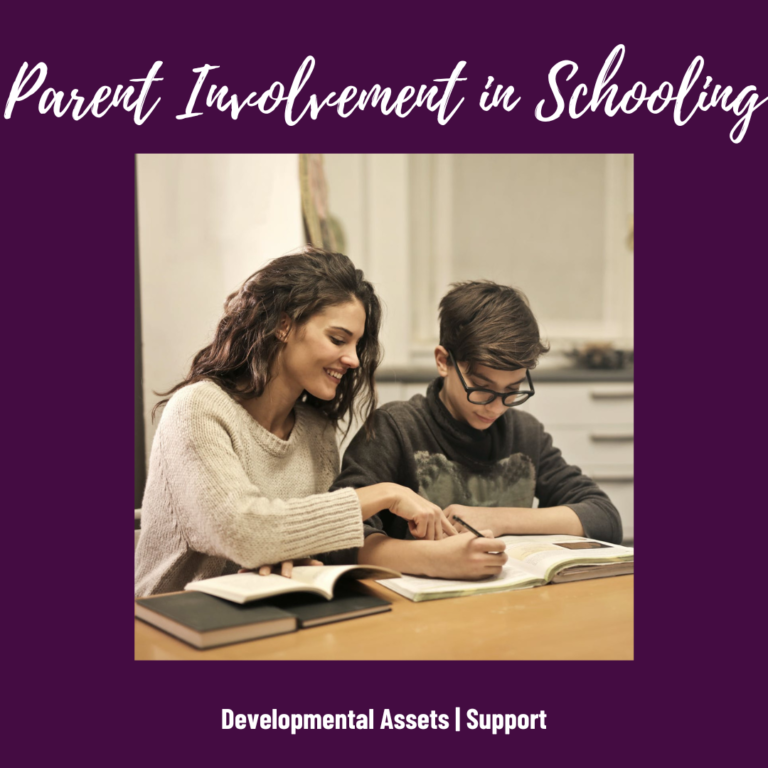
Parent Involvement in Schooling · Be actively involved in helping your child succeed in school. Assist them with their homework and make sure they are giving their best.
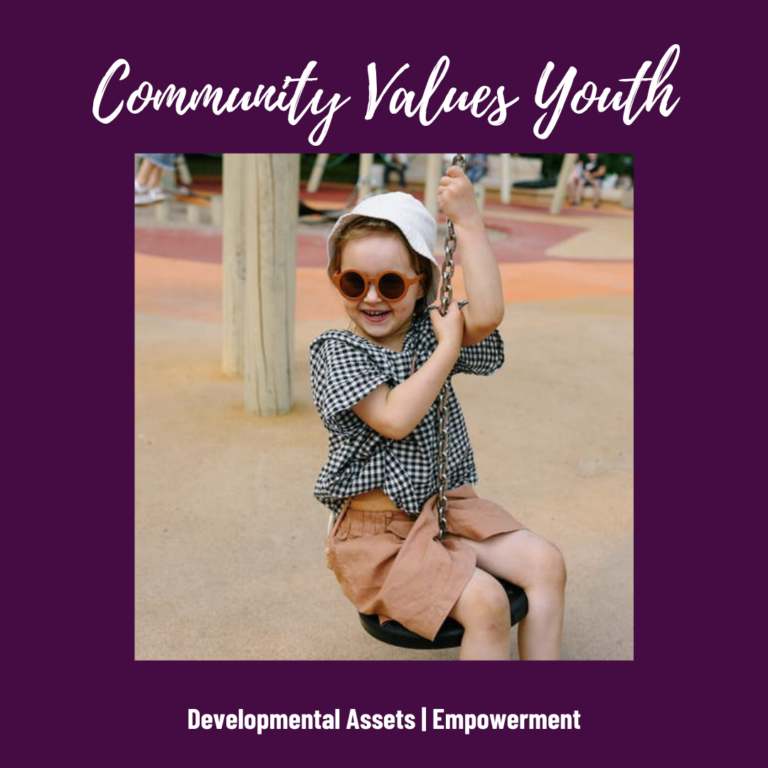
Community Values Youth · Surround your child with a community that values them. Spend time at locations and events that show your child their community cares about them, such as community parks or playgrounds or the Redding and Anderson Teen Centers.
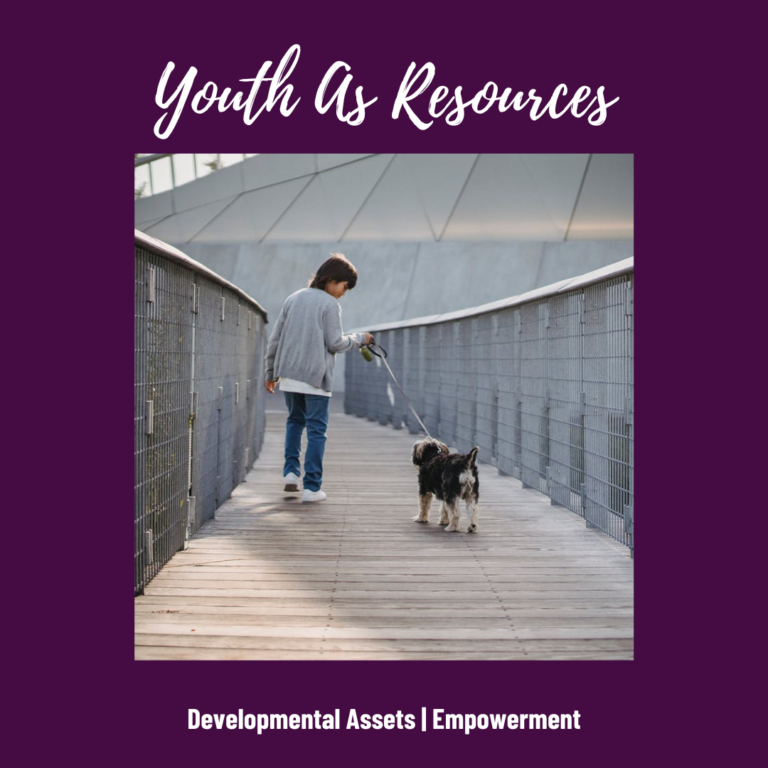
Youth as Resources · Be part of a community that gives your child useful roles in the community.
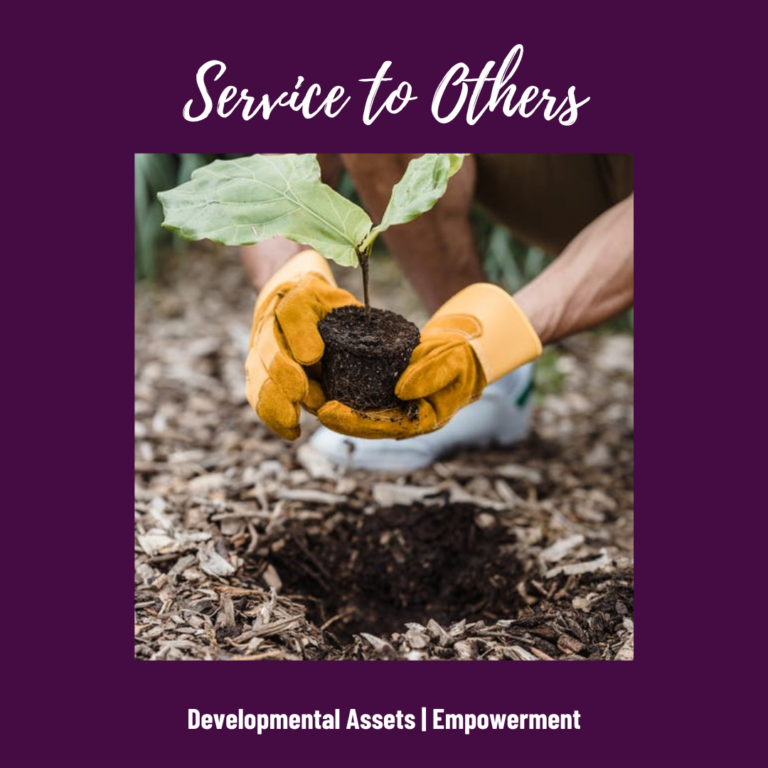
Service to Others · Encourage your child to serve the community. Picking up trash at a local park, selling lemonade to fundraise for a local cause, or spending time with people in a nursing home are all ways your child can serve the community.
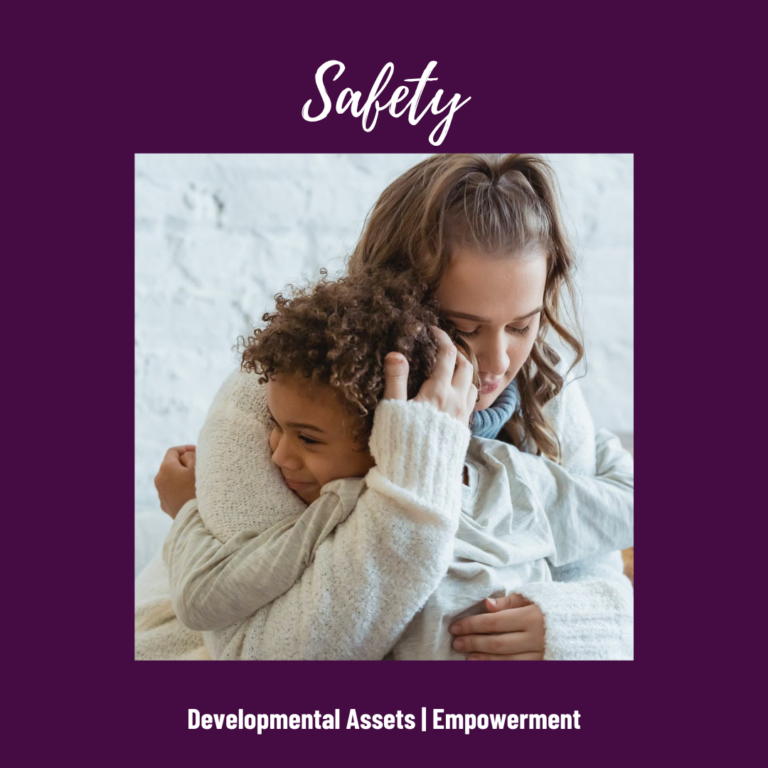
Safety · Make sure your child feels safe at home, school, and in their neighborhood. Keep an eye on your children as they play outside or ride their bike down the street. Ask your child if they feel safe, and if they don’t, ask how you can help them feel safe.
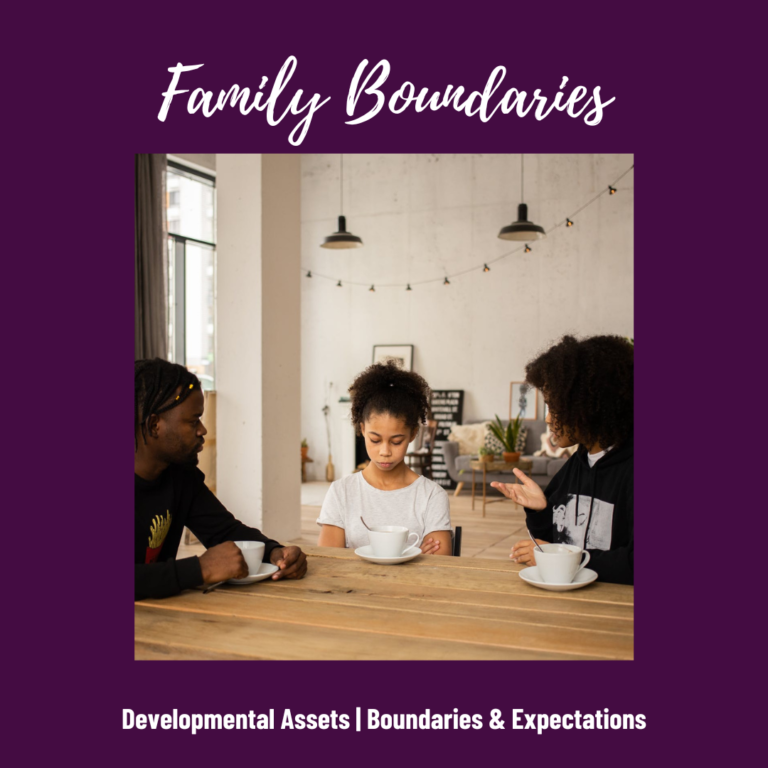
Family Boundaries · Set clear rules and boundaries for your child and make sure they understand them and their importance. Have a curfew and be aware of where they go and who they spend their time with.

School Boundaries · Schools need clear rules and boundaries to be successful. Support your child’s teacher by explaining the importance of following school rules to your child.

Neighborhood Boundaries · Young people benefit from knowing their neighbors are looking out for their safety, as well as monitoring their behavior. Get to know the people who lie near you. Talk with other parents about the neighborhood boundaries they would like for their children.
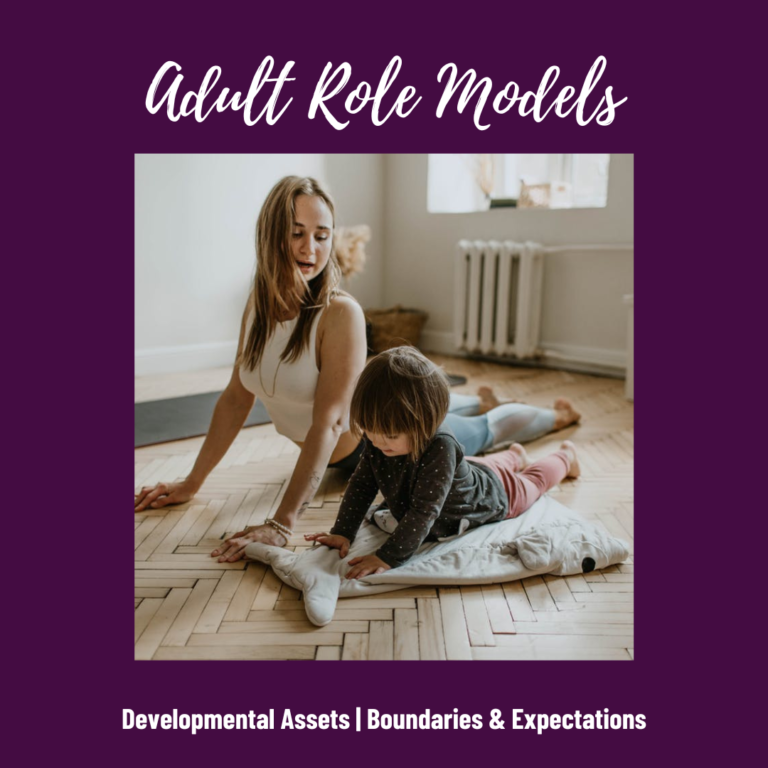
Adult Role Models · Surround your child with other adults who model positive, responsible behavior. Children look up to and admire other adults, and you want those people to be good examples.
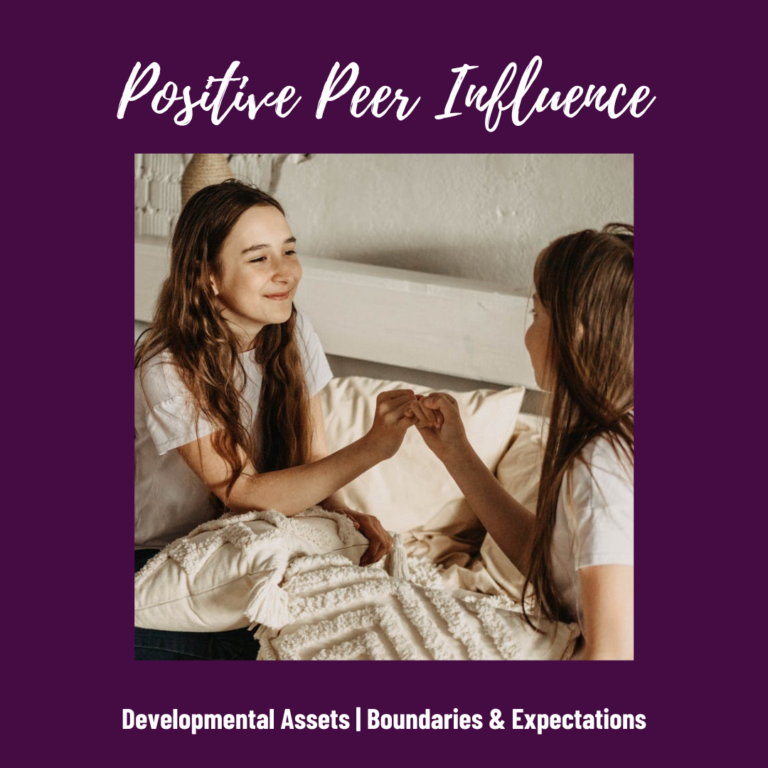
Positive Friend Influence · Encourage your child to choose friends that model responsible behavior. Limit time with friends who are negative influences on your child.

High Expectations · Motivate your child to do well and ask that their teachers encourage them too. Explain to your child what is expected of them at home and at school and encourage them to follow those expectations.
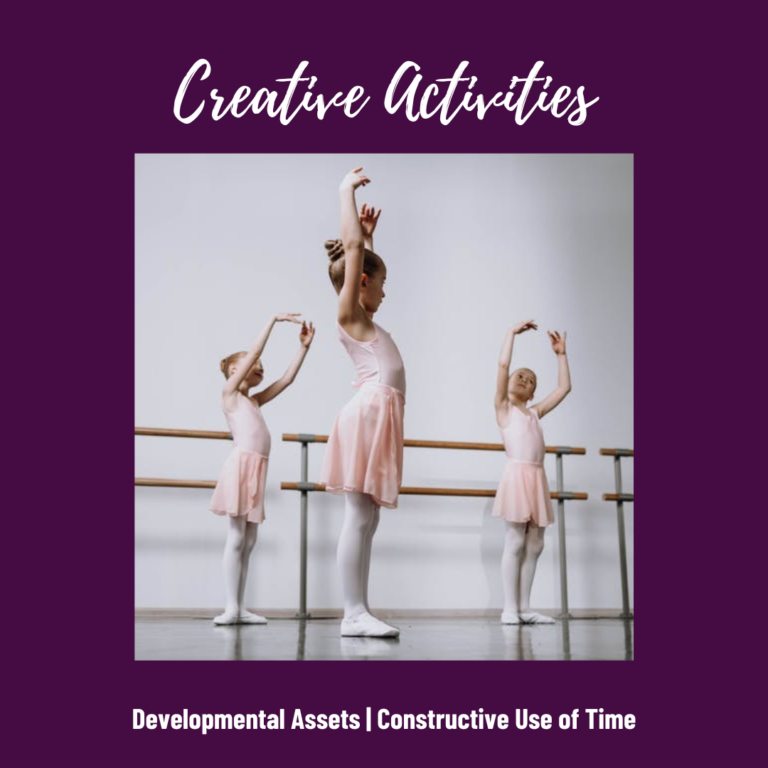
Creative Activities · Encourage your child to find a hobby like music or art and support their choice by providing what they need to be creative.
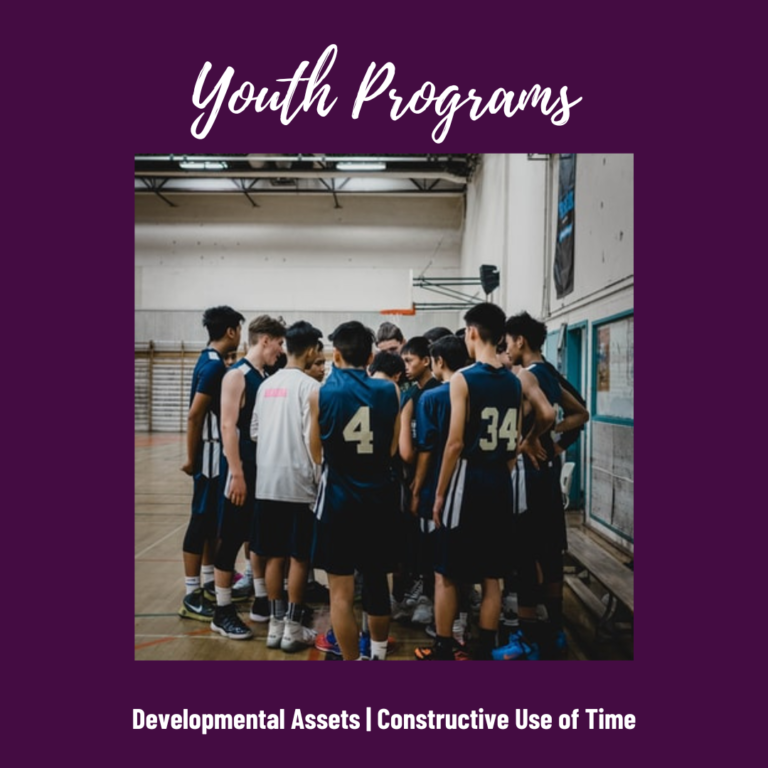
Youth Programs · Children should spend time participating in sports or other group activities. Encourage your child to find a sport they enjoy doing and support them by attending their events. Sports encourage teamwork and physical activity.

Religious Community · Children thrive when they spend time with a youth group or other religious community. These groups encourage bonding with their peers and having high standards.
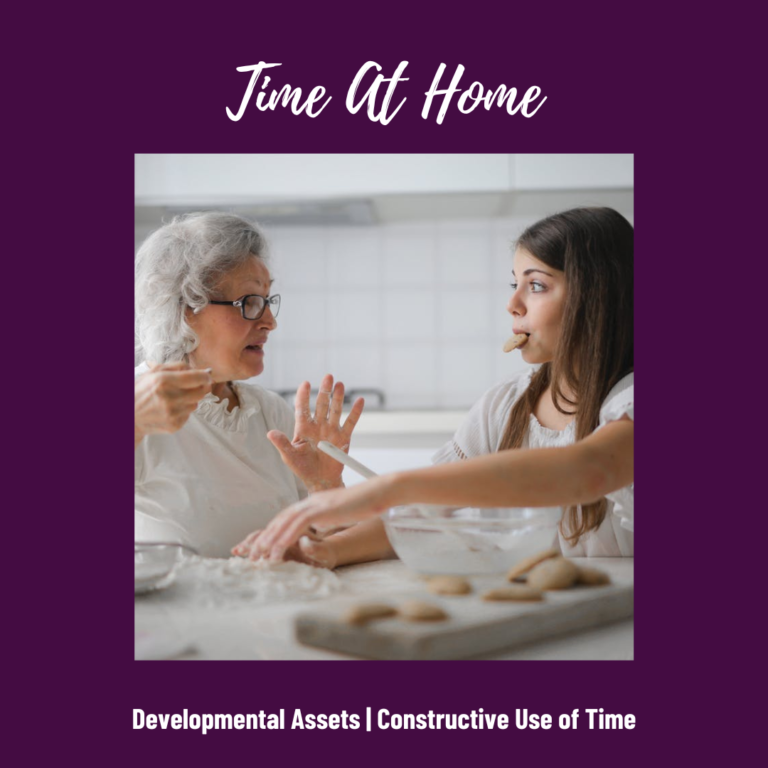
Time at Home · Create a home atmosphere where your child will want to spend time. Give them a space that’s all their own. Provide opportunities to strengthen family bonds, such as having dinner together as a family, to increase communication.
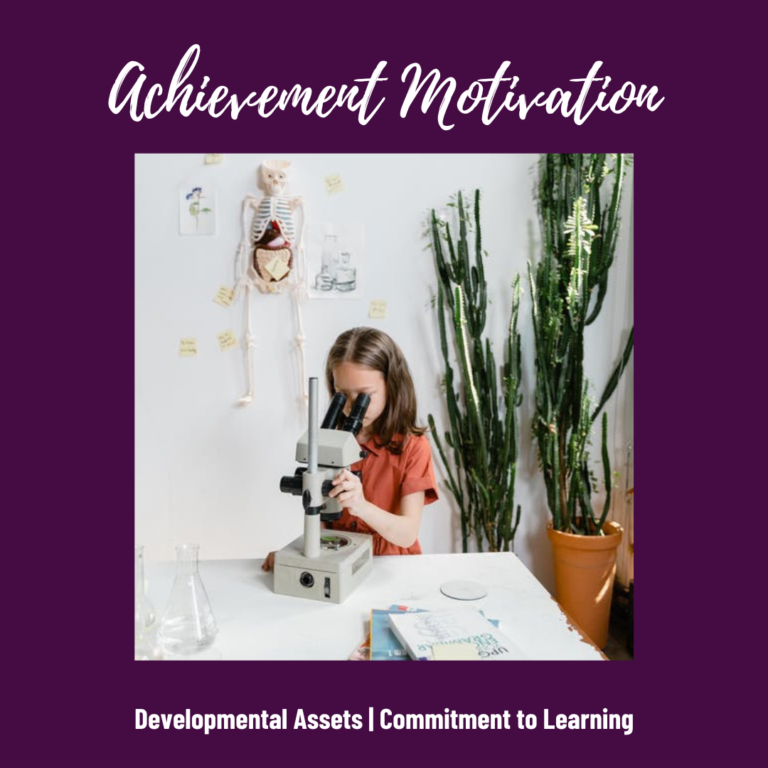
Achievement Motivation · Help your child enjoy school by making learning fun. Ask them about their favorite subject and what they like about it. Sitting with your child as they complete homework shows them that you value them and school achievement.
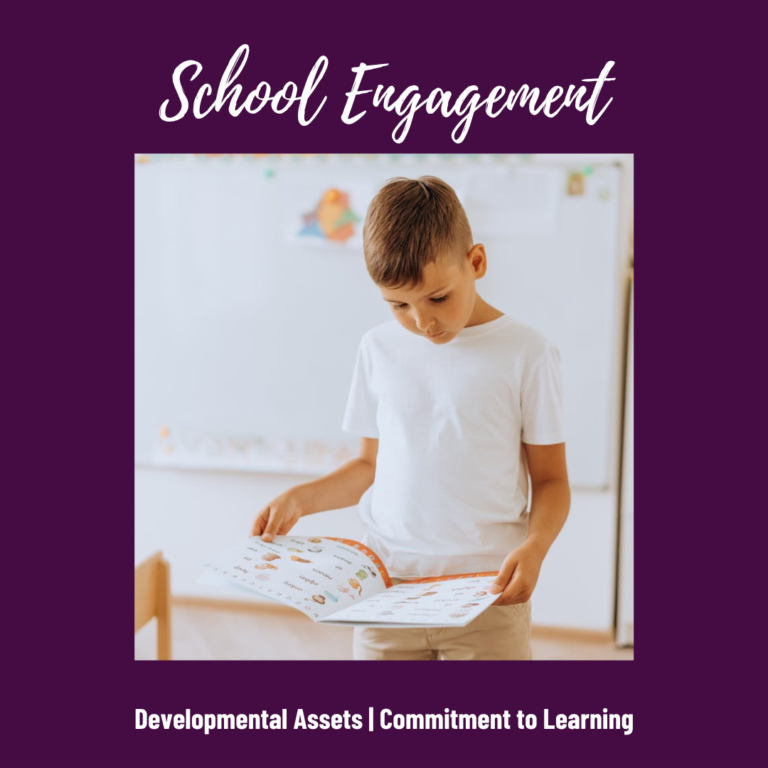
School Engagement · Children who are actively engaged in school will have a greater chance of enjoying learning. Keep your child involved with school events and take time to ask how school was at the end of each day. Try using questions that require more than a “yes” or “no” answer, such as, “What was your favorite part of the day?”
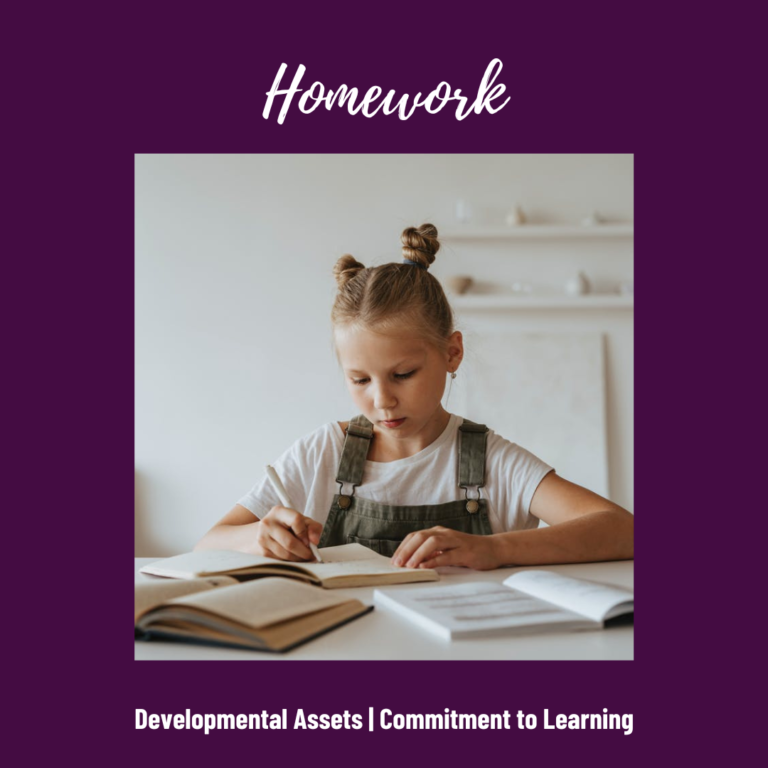
Homework · Make sure your child completes their homework each day as to not fall behind. Sit with them when they need help and keep them focused, not forgetting to allow breaks as needed.

Bonding to School · Support your child’s relationship with their school by encouraging them to be involved at school and show school spirit. Attend and participate in school events and programs.

Reading for Pleasure · Encourage your child to read for fun. Take them to the library to pick out their own books. Spend time reading books with them before bedtime, going back and forth reading to them and having them read to you.
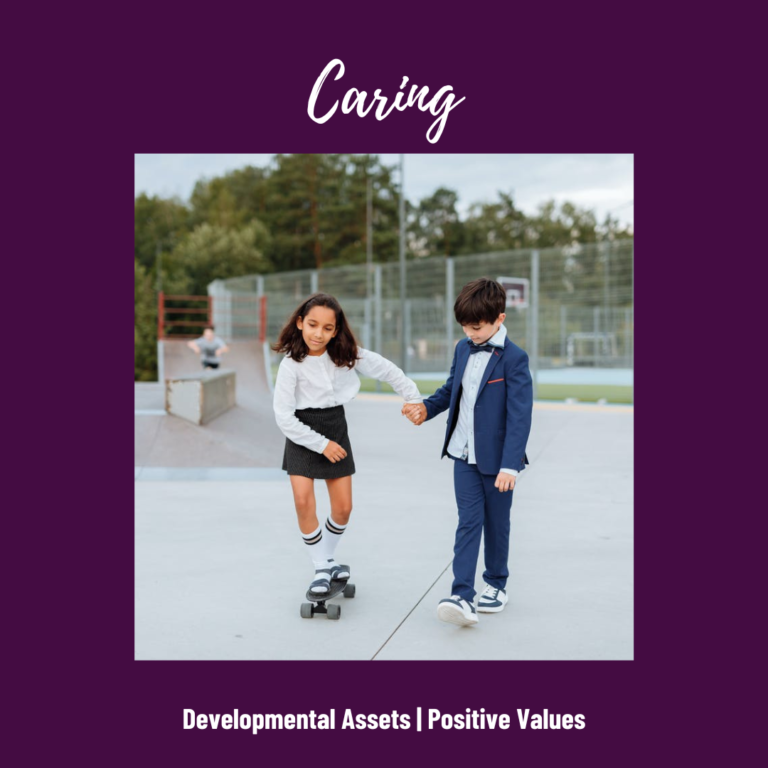
Caring · Place a high value on your child helping others. Remind them to think of others’ feelings and treat others with kindness. Give them examples of when they were caring and how they can be caring. Be a positive example by caring for others and for yourself.

Equality and Social Justice · Show your child the importance of equality. Teach them fairness, like taking turns and sharing. Donate to a local food bank or to those in need, showing your child the value of giving to others.

Integrity · Teach your child the importance of standing up for what they believe in. Peer pressure can be a challenge. Remind your children that it’s always worth it to do what’s right.
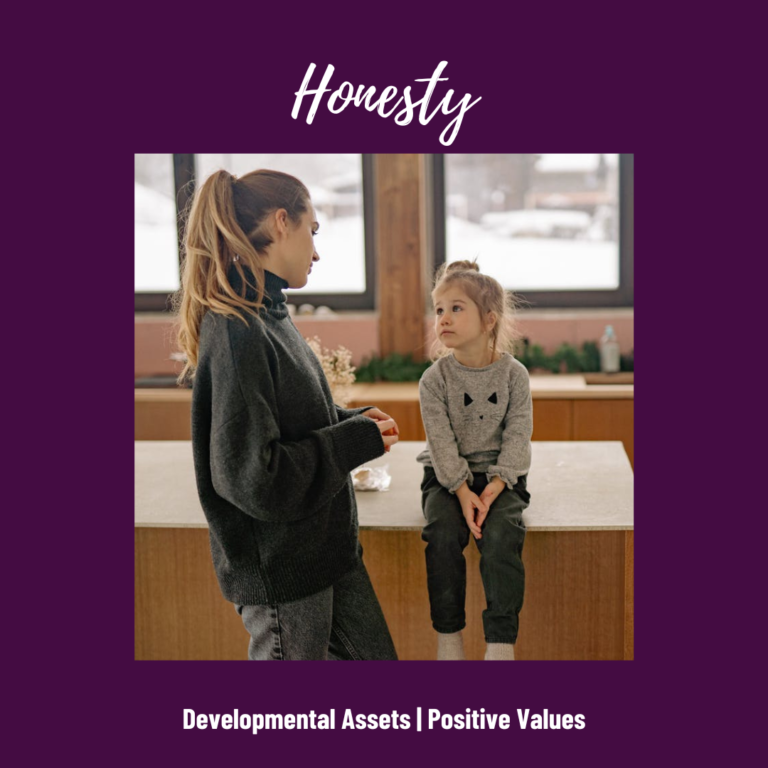
Honesty · Teach your child to tell the truth, even when it’s not easy. Make it clear that you will forgive their mistakes and expect them to learn from those mistakes. Applaud them when they tell the truth and teach them the importance of trust.
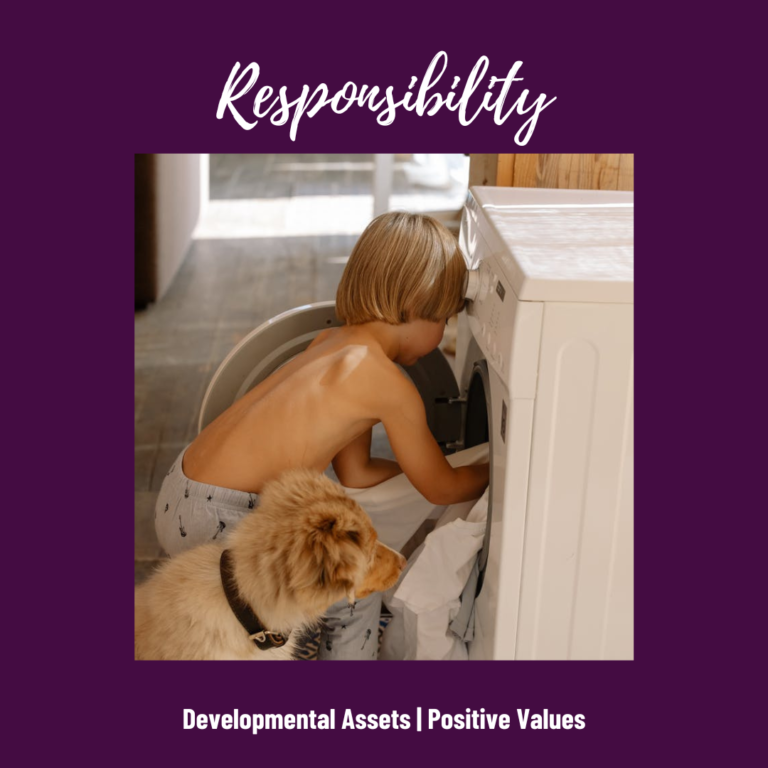
Responsibility · Give your child opportunities to help around the house and be responsible for certain household chores. Create a reward system for the when they complete these responsibilities. Increase the level of responsibility as they grow up.
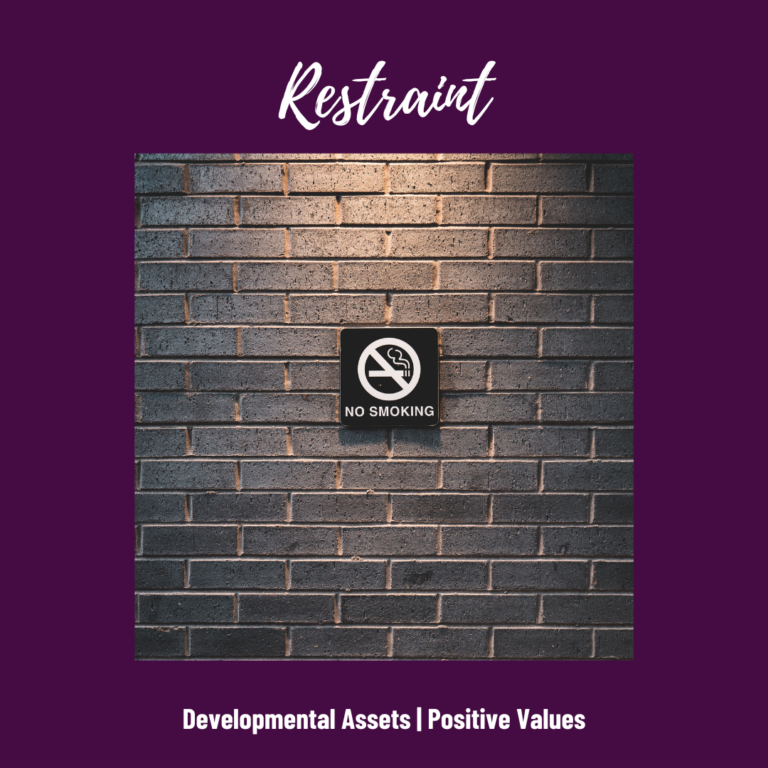
Restraint · Instill in your child the importance of not falling to peer pressure when it comes to promiscuity, alcohol, or other drugs. Explain the negative side effects of these choices and healthier alternatives.
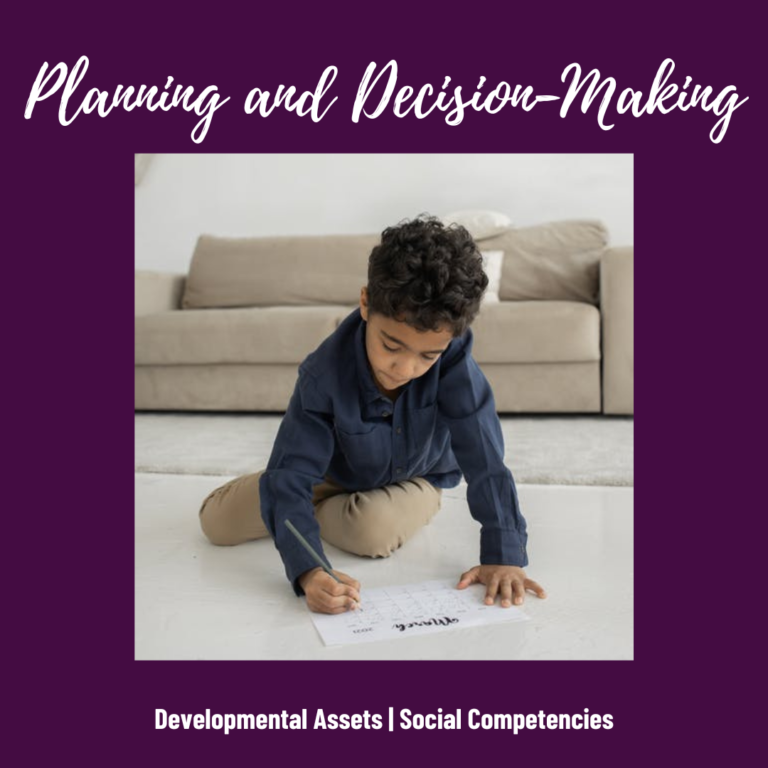
Planning and Decision-Making · Teach your child how to plan ahead and make choices. Give them opportunities to create a to-do list for an end goal, such as a party. Let them choose between different options so they feel a sense of control and practice decision-making.
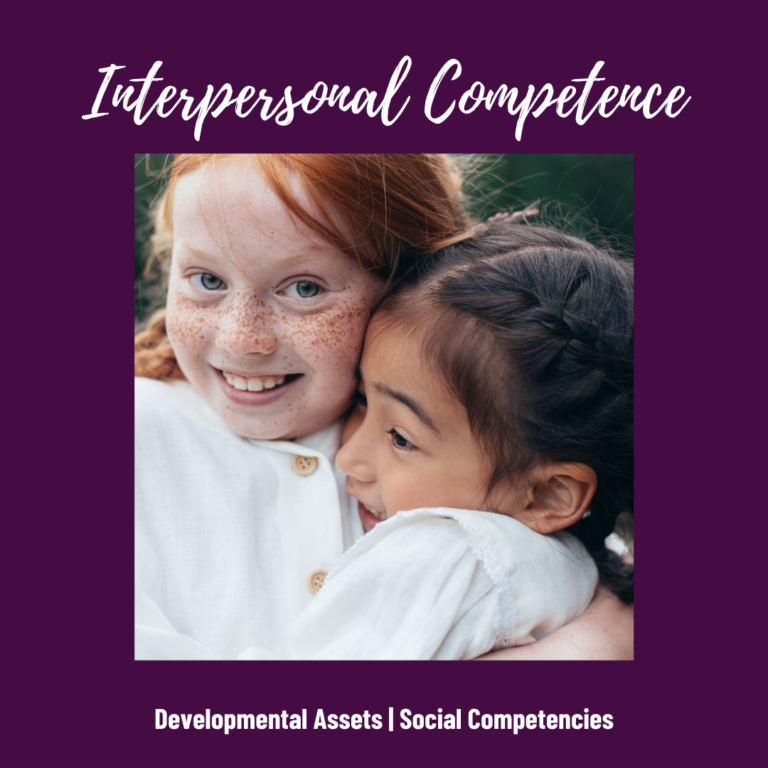
Interpersonal Competence · Encourage your child to be sensitive to others’ feelings. Teach them how to be a good friend and support their friendships by scheduling time for them to spend time together.
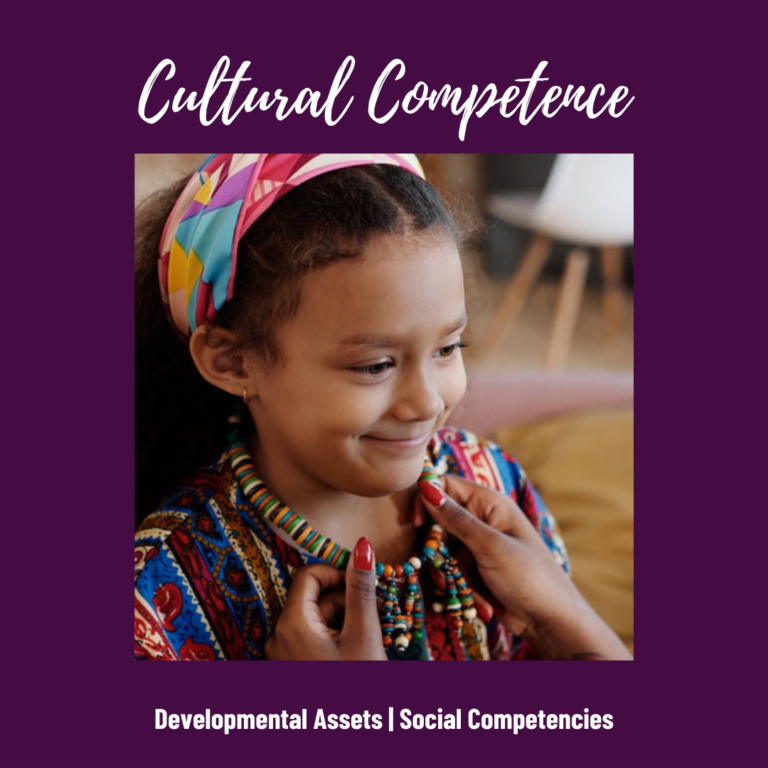
Cultural Competence · Educate your child on different cultures. Take them to cultural events or introduce them to people who come from different backgrounds. This will show your child how other people live and appreciate their differences.
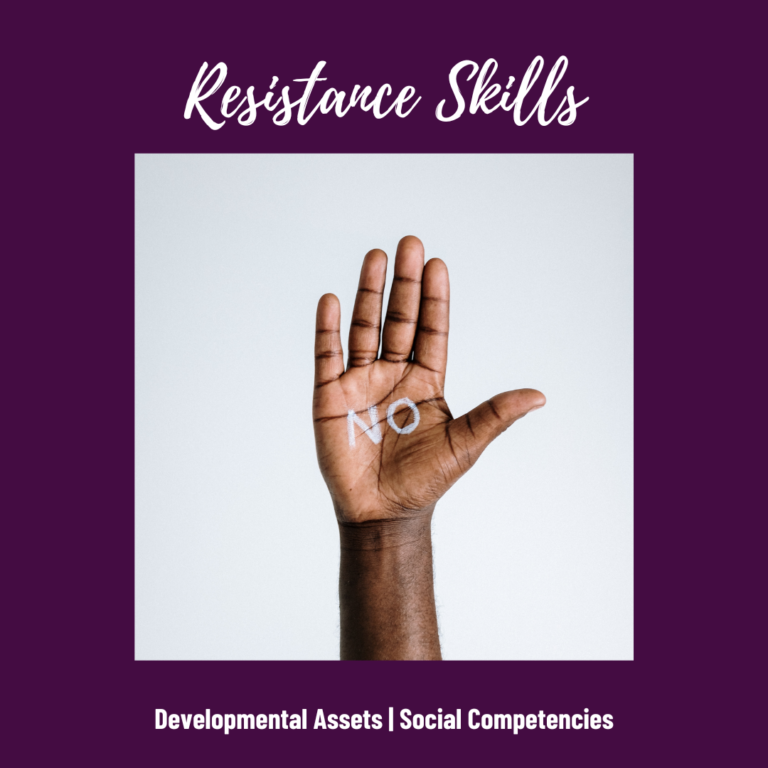
Resistance Skills · Communicate with your child the importance of resisting negative peer pressure and dangerous situations. Explain the potential negative consequences of poor decisions and tell them you’re proud when they make the right choice.

Peaceful Conflict Resolution · Teach your child how to resolve disagreements with kind words rather than violence or aggression. Share with them how they can keep their voice down and still be heard rather than yelling. Remind them to also listen to the other person so they feel heard.
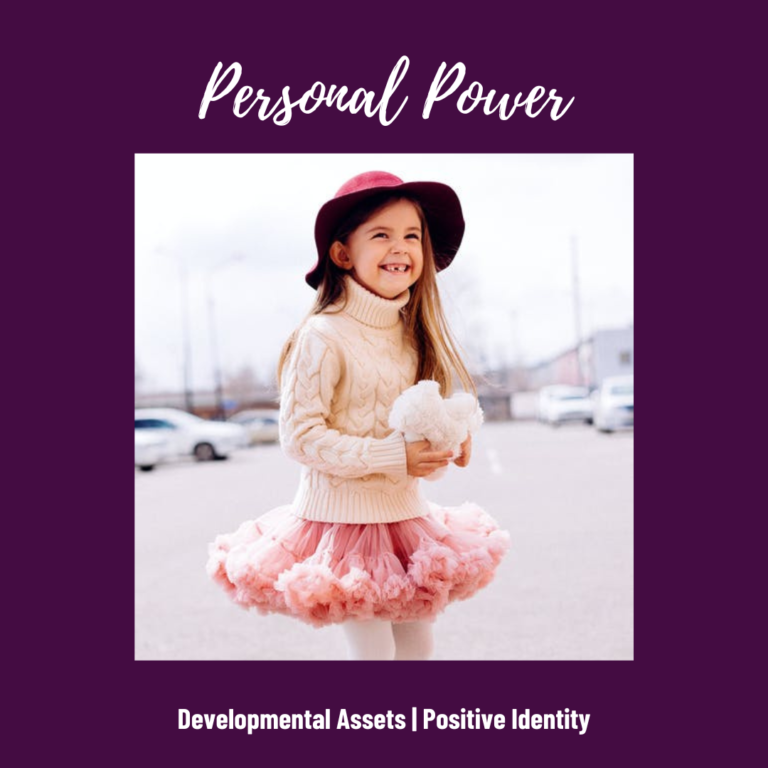
Personal Power · Remind your child that they have control over their life. They can’t always choose what happens to them, but they can choose how they respond. Encourage them to have a positive attitude no matter how things turn out.
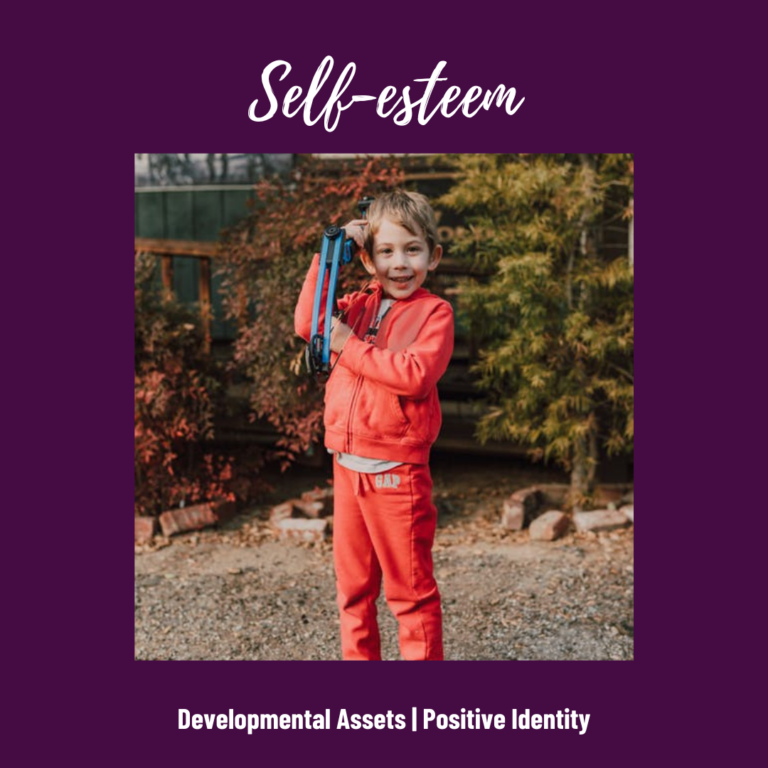
Self-esteem · Highlight your child’s strengths. Tell them what is special about them and encourage them to love themselves for who they are. Children who know their worth are more likely to be happy and treat others kindly.
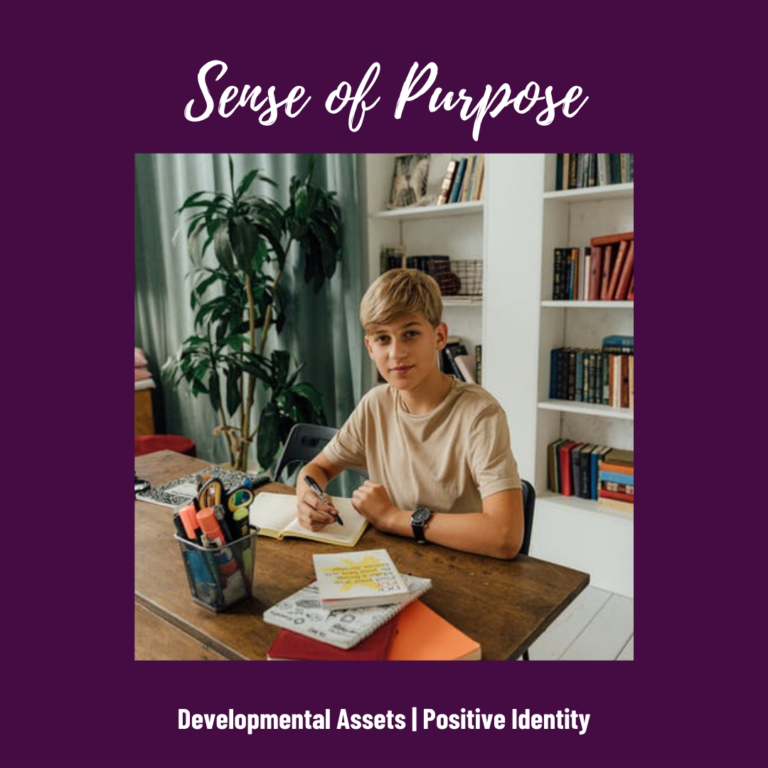
Sense of Purpose · Show your child how they contribute to society. Remind them what they do that makes the world a better place and encourage them to continue to make a positive impact on their community.

Positive View of Personal Future · Give your child things to look forward to. Remind them they have a choice as to what they do with their lives. Encourage them to work hard to accomplish their personal goals and believe in their future plans.
Resources for Parents Seeking Help Healing From Their Adversity
How Parents Can Heal from Childhood Adversity: PACES for Parents

Spend time with a friend or family member
Friendship and family support have been shown to decrease stress for adults who have experienced ACEs.
Practical suggestion: Set a time each week to spend with a close friend or family member, either in-person or on the phone. This can be a chance to share your feelings in a safe space. Utilize naptime if your child is young.

Connect with your community
Being a member of a community group or organization can decrease feelings of loneliness and increase life satisfaction.
Practical suggestion: Take part in informal community gatherings, religious/spiritual events, parent groups, or other social groups when you have time. Reach out and talk with neighbors and community members.
Engage in civic or volunteer work
Like community involvement, civic and volunteer work can increase social connection. Volunteering with your child can be especially helpful.
Practical suggestion: Take part in clean up days in parks or your neighborhood. Join a walk in your area to benefit a charity. Serve dinner at a homeless shelter. Religious organizations often have many volunteer opportunities available for parents and children.
Share positive childhood memories
Recalling positive memories from one’s own childhood may help to buffer the negative effects of childhood adversity.
Practical suggestion: Take time to share or think about special, positive memories from your childhood when you felt loved and cared for.
Eat healthy, regular meals
Eating meals each day with fruits and vegetables is good for your health. Also, regular mealtimes provide an opportunity to eat as a family.
Practical suggestion: Set a regular time for family dinner during the week to connect and share about each other’s day.
Engage in exercise
Physical exercise is also important for physical and mental health. Exercise can decrease feelings of depression and anxiety.
Practical suggestion: It can be difficult to engage in regular exercise. Make small adjustments: Take the stairs. Park far from the building. Stand at your desk or walk during your lunch break.
Get enough sleep
Getting too little sleep can increase parenting stress, irritability, and fatigue.
Practical suggestion: Try to get 8 to 8 ½ hours of sleep per night. Establish a regular bedtime for your children and yourself. Avoid using your phone 30 minutes before bed.
Practice mindfulness
Mindfulness is the practice of being present and noting your feelings and thoughts. Practicing mindfulness can reduce parenting stress and increase positive parenting.
Practical suggestion: Mindfulness can be easily added into your busy day. Free audio and video meditation guides can be found online.
Engage in an enjoyable hobby
Having a hobby can increase feelings of competency, self-esteem, and reduce stress. A hobby you can share with your child can increase connectedness.
Practical suggestion: Set aside time for your favorite hobby each week. If you don’t have a hobby, think about activities you enjoyed as a child, or ask others about their hobbies to gain ideas.

Join First 5 Executive Directors Wendy Dickens (Shasta) and Heidi Mendenhall (Tehama) as they showcase local 0-5 resources, tell amazing stories of our North State champions for children, and unpack how we can continue to make a difference for young children and families. Be prepared to learn and be inspired by your community.
-
-
The State of Education
Listen nowJudy Flores, Shasta County Superintendent of Schools, discusses education
-
Who is Your Champion?
Listen nowMike Freeman, Shasta County Office of Education Associate Superintendent of Instructional Services, talks about hinge moments, having intentionality, and staying curious


Resilience Questionnaire:
How many of these 14 protective factors did I have as a child?


